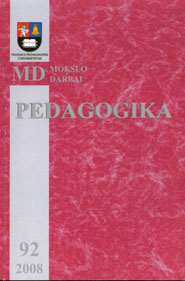Mokytojų ir mokinių požiūris į mokinių iškalbą bei jos ugdymo galimybes bendrojo lavinimo mokykloje
Teachers’ and Pupils’ Attitude Towards Learners’ Eloquence and Its Development Possibilities in Secondary School
Author(s): Birutė ŽygaitienėSubject(s): Education
Published by: Vytauto Didžiojo Universitetas
Keywords: culture of speech; eloquence; oratory; speech competence; verbal communication.
Summary/Abstract: An empirical research was conducted following the created research model, where 436 8th-10th formers and 54 teachers participated. The research was carried out in Vilnius city - Fabijoniškių and Saulėtekio secondary schools as well as Gabijos and Karoliniškių gymnasia. The article describes and analyses only reliable chisquare criteria. This empirical research has revealed that good eloquence is very important for both respondents’ groups. Pupils overestimate their eloquence as compared to their teachers’ opinion - 63.0 % of teachers consider their learners’ eloquence as average and even 37.0 % of teachers think of it as poor, while pupils themselves evaluate their eloquence as good (47.2 %) or average (38.3 %). Dependence of eloquence evaluation on learners’ participation in after-school activities, their learning level, frequency of reading activity, and frequency of their public speeches was noticed: the more frequently the respondents participate in after-school activities, the more they speak in public, the more they read and the better their learning results are, the more favourably they evaluate their eloquence. Both the teachers and learners who participated in the research are convinced that it is very important to develop learners’ eloquence at school. At present, pupils’ eloquence is mainly developed in lessons of the Lithuanian language (96.1 %) and lessons of foreign languages (54.9 %). Only 23.4 % of pupils and only 37.0 % of teachers believe that learners’ eloquence should be developed during all the lessons. Some teachers who participated in the research think that there are possibilities to develop eloquence in other lessons as well - lessons of natural sciences (25.9 %), lessons of foreign languages (37 %), lessons of artistic development (20.4 %).
Journal: Pedagogika
- Issue Year: 2008
- Issue No: 92
- Page Range: 24-30
- Page Count: 7
- Language: Lithuanian

